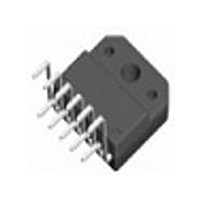LM3886TF National Semiconductor, LM3886TF Datasheet - Page 4

LM3886TF
Manufacturer Part Number
LM3886TF
Description
92F299
Manufacturer
National Semiconductor
Datasheet
1.LM3886TF.pdf
(24 pages)
Specifications of LM3886TF
Operational Class
Class-AB
Audio Amplifier Output Configuration
1-Channel Mono
Output Power (typ)
68x1@4OhmW
Audio Amplifier Function
Speaker
Input Offset Voltage
10@±28VmV
Input Bias Current
1uA
Total Harmonic Distortion
0.03@4Ohm@60W%
Single Supply Voltage (typ)
18V
Dual Supply Voltage (typ)
±12/±15/±18/±24V
Power Supply Requirement
Single/Dual
Power Dissipation
125W
Unity Gain Bandwidth Product (typ)
8MHz
Rail/rail I/o Type
No
Power Supply Rejection Ratio
120dB
Single Supply Voltage (min)
20V
Single Supply Voltage (max)
84V
Dual Supply Voltage (min)
±10V
Dual Supply Voltage (max)
±42V
Operating Temp Range
-20C to 85C
Operating Temperature Classification
Commercial
Mounting
Through Hole
Pin Count
11 +Tab
Package Type
TO-220
Amplifier Class
AB
No. Of Channels
1
Output Power
68W
Supply Voltage Range
20V To 84V
Load Impedance
4ohm
Operating Temperature Range
-20°C To +85°C
Amplifier Case Style
TO-220
Rohs Compliant
No
Lead Free Status / RoHS Status
Not Compliant
Available stocks
Company
Part Number
Manufacturer
Quantity
Price
Part Number:
LM3886TF
Manufacturer:
CN/如韵
Quantity:
20 000
Company:
Part Number:
LM3886TF/NOPB
Manufacturer:
AVX
Quantity:
40 000
Part Number:
LM3886TF/NOPB
Manufacturer:
TI/德州仪器
Quantity:
20 000
www.national.com
CMRR
(Note 3)
A
(Note 3)
GBWP
e
SNR
IMD
IN
VOL
Electrical Characteristics
Symbol
Note 2: Operation is guaranteed up to 84V, however, distortion may be introduced from SPIKe Protection Circuitry if proper thermal considerations are not taken
into account. Refer to the Thermal Considerations section for more information. (See SPIKe Protection Response)
Note 3: DC Electrical Test; refer to Test Circuit #1.
Note 4: AC Electrical Test; refer to Test Circuit #2.
Note 5: All voltages are measured with respect to the GND pin (pin 7), unless otherwise specified.
Note 6: Absolute Maximum Ratings indicate limits beyond which damage to the device may occur. Operating Ratings indicate conditions for which the device is
functional, but do not guarantee specific performance limits. Electrical Characteristics state DC and AC electrical specifications under particular test conditions which
guarantee specific performance limits. This assumes that the device is within the Operating Ratings. Specifications are not guaranteed for parameters where no limit
is given, however, the typical value is a good indication of device performance.
Note 7: For operating at case temperatures above 25˚C, the device must be derated based on a 150˚C maximum junction temperature and a thermal resistance
of θ
Note 8: Human body model, 100 pF discharged through a 1.5 kΩ resistor.
Note 9: The operating junction temperature maximum is 150˚C, however, the instantaneous Safe Operating Area temperature is 250˚C.
Note 10: Typicals are measured at 25˚C and represent the parametric norm.
Note 11: Limits are guaranteed to National’s AOQL (Average Outgoing Quality Level).
Note 12: The LM3886T package TA11B is a non-isolated package, setting the tab of the device and the heat sink at V
mounted to the heat sink using only thermal compound. If a mica washer is used in addition to thermal compound, θ
will be isolated from V
Note 13: The feedback compensation network limits the bandwidth of the closed-loop response and so the slew rate will be reduced due to the high frequency
roll-off. Without feedback compensation, the slew rate is typically larger.
Note 14: V
Note 15: The output dropout voltage is the supply voltage minus the clipping voltage. Refer to the Clipping Voltage vs Supply Voltage graph in the Typical
Performance Characteristics section.
Note 16: The Differential Input Voltage Absolute Maximum Rating is based on supply voltages of V
The following specifications apply for V
apply for T
(Note 4) Input Noise
JC
= 1.0 ˚C/W (junction to case). Refer to the Thermal Resistance figure in the Application Information section under Thermal Considerations.
−
must have at least −9V at its pin with reference to ground in order for the under-voltage protection circuitry to be disabled.
Common Mode Rejection Ratio
Open Loop Voltage Gain
Gain-Bandwidth Product
Signal-to-Noise Ratio
Intermodulation Distortion Test
A
= 25˚C.
−
.
Parameter
+
= +28V, V
(Notes 5, 6) (Continued)
−
V
V
|V
|V
f
IHF — A Weighting Filter
R
P
Measured at 1 kHz, R
P
Measured at 1 kHz, R
60 Hz, 7 kHz, 4:1 (SMPTE)
60 Hz, 7 kHz, 1:1 (SMPTE)
O
+
CM
O
O
IN
= −28V, I
+
+
= 100 kHz, V
| = |V
| = |V
= 60V to 20V, V
= 1W, A-Weighted,
= 60W, A-Weighted,
= 600Ω (Input Referred)
= 20V to −20V, I
−
−
| = 28V, R
| = 30V
4
MUTE
Conditions
IN
= −0.5 mA with R
= 50 mVrms
−
L
= −20V to −60V,
o
= 2 kΩ, ∆V
S
S
= 0 mA
= 25Ω
= 25Ω
+
= +40V and V
O
L
= 40V
= 4Ω unless otherwise specified. Limits
CS
−
(case to sink) is increased, but the heat sink
= −40V.
−
potential when the LM3886 is directly
(Note 10)
Typical
0.004
0.009
92.5
110
115
110
2.0
8
LM3886
(Note 11)
Limit
85
90
10
2
µV (max)
MHz (min)
dB (min)
dB (min)
(Limits)
Units
dB
dB
%












